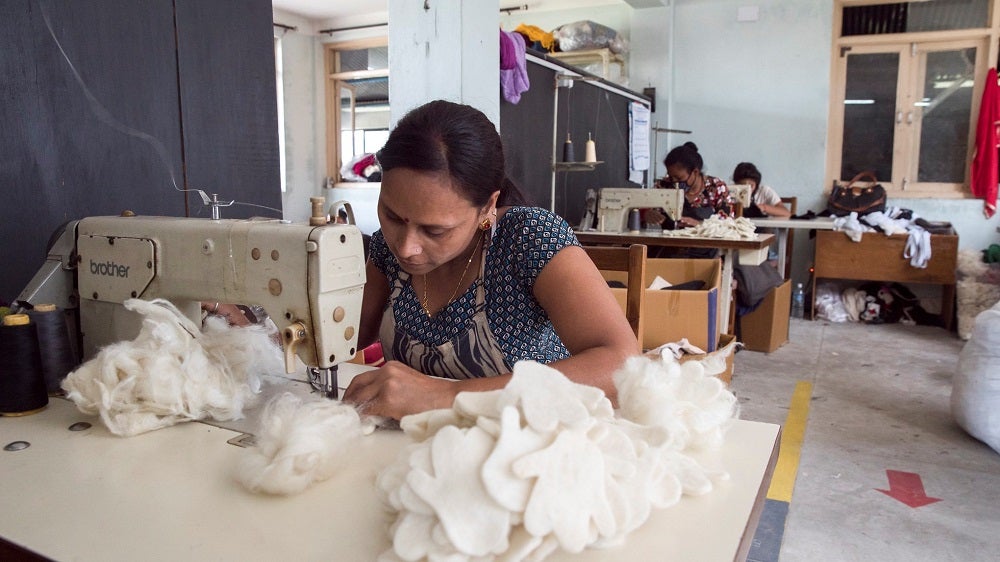 Workers at a clothing factory in Nepal.
Workers at a clothing factory in Nepal.
Small businesses represent over 95 percent of all enterprises and account for more than 60 percent of employment worldwide. The outsized role of these companies is even more pronounced in emerging economies, where they contribute substantially to job creation, the provision of public goods and services, and supporting economic growth and poverty reduction.
These businesses are also among the hardest hit by the pandemic. Often led by entrepreneurs and backed by personal funds, many micro and small enterprises (MSEs) struggle to get adequate capital and are vulnerable even in the best of times. Social distancing, temporary closures, and health and safety directives have interrupted business, cut labor productivity, and reduced revenues—leaving many unable to meet debt obligations as they come due. Without stronger legal and regulatory frameworks for insolvency, many countries will face a difficult period of rising bankruptcies that could stifle entrepreneurship and growth for years to come.
Despite all the challenges faced by smaller companies, many domestic insolvency systems are designed primarily with large corporations in mind. MSEs face unique disadvantages in navigating complicated and time-consuming bankruptcy systems. They may not have resources to hire lawyers, and they have a harder time getting funding—a key element of a productive restructuring. Because the sums at stake in struggling MSEs are small, banks and other creditors often adopt a passive attitude, instead of actively spending resources in restructuring these companies. This typically leads to a piecemeal liquidation of the enterprise. In some countries, debtors remain mired in obligations, even after the insolvency process concludes.
This can leave domestic insolvency processes inadequately supervised, inaccessible, and unable to promote efficient business restructuring or exit for MSEs. The heavy stigma of bankruptcy and the failure to discharge debts in many countries remain obstacles to entrepreneurship.
In light of this, there is an emerging consensus that effective insolvency and creditor rights (ICR) systems must be attentive to the unique needs of MSEs and tailored to serve them specifically.
As a standard setter, the World Bank, together with the United Nations Commission on International Trade Law (UNCITRAL), has launched newly updated Principles for Effective Insolvency and Creditor/Debtor Regimes (ICR Principles). They reflect new principles to address the insolvency of MSEs and provide a valuable resource for governments considering domestic ICR reform to deal with increasing numbers of distressed MSEs.
The main thrusts of these changes are simplification of insolvency processes for MSEs and ensuring discharge of debts at the end of the process for natural person entrepreneurs. Key benchmarks in the new MSE ICR Principles include: the promotion and bolstering of informal, out-of-court workouts, or a hybrid combination of court and out-of-court processes; simplified restructuring procedures; and a broad discharge-of-debts regime following liquidation for entrepreneurs. These components are flexible and can be adapted to fit any domestic insolvency and creditor/debtor system, either through adjustments to pre-existing laws or the establishment of a separate MSE framework by governments.
The new MSE ICR Principles also provide guidance on discrete legislative and regulatory design elements such as: eligibility, commencement criteria, conversion of proceedings, procedural formalities, the treatment of management after filing, reorganization plans, and discharge. More broadly, the MSE ICR Principles address the reduction of barriers to MSE debtors’ use of insolvency systems through the introduction of simplified, affordable, and quick processes, while protecting creditors’ rights.
Because of MSEs’ critical role in the global economy, the success of post-pandemic recovery efforts will depend on their financial health. The right policies and governmental interventions are crucial in ensuring that viable MSEs survive going forward and that entrepreneurs who must close a business can achieve a fresh start in better economic conditions. Given MSEs’ precarious financial positions in the wake of COVID-19, policy makers should include an assessment of domestic insolvency laws into their pandemic response efforts, with a particular focus on how such regimes currently serve MSEs and small entrepreneurs. Doing so could promote growth, bolster financial sector stability, and protect viable firms in domestic economies. It could also help facilitate a positive, more resilient, and sustainable future for small businesses around the world.
For more on insolvency and the World Bank's work in the area, watch the event series Corporate Debt in Developing Countries: Preparing for the Worst and Hoping for the Best


Join the Conversation